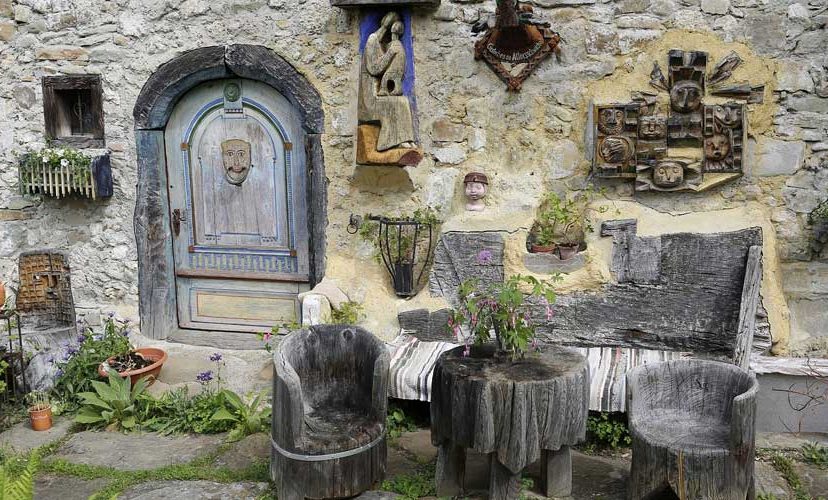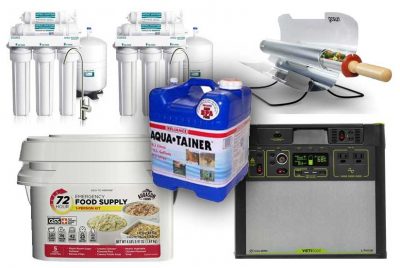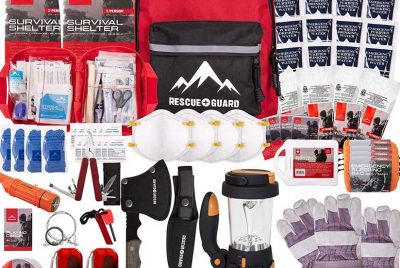There are lots of cheap prepper supplies that are great for building a beginner's survival kit.…
Off-Grid Living: An Introductory Guide

Are you ready to get back to nature? Are you considering moving off-grid, living a life without city water, electricity, gas, or other utilities? Or are you just not sure what off-grid living actually is and want to find out more? Read on to learn more about this interesting subject.
What Does the Term “Off-Grid Living” Actually Mean?
If you know anything about electricity you have certainly heard of the term grid. An electric grid is what connects to most businesses and home. It’s the method of providing power or electricity to those structures. There is also a water grid, providing water to those same buildings. When someone chooses to live off-grid it means they’re choosing to live their life disconnected from the electric grid, water grid, and utilities. Most people don’t usually even consider where these things come from and just take them for granted.
Off-grid homesteaders usually have their own well that supplies their home with water. They choose to unhook themselves from city water. For electricity, they prefer solar power, or perhaps wind power. The whole idea of off-grid living is self-sustainability instead of tapping into these grids. These people are usually just looking for a simpler and less complicated way of living.
Why Do People Choose To Live Off-Grid?
There are many reasons why people choose to live off-grid. The reason for some people is their distrust of the government. These homesteaders feel safer being disconnected from society and governmental control. Others feel satisfaction in being fully self sufficient. They love the idea of not being reliant on anyone or anything else. Still others are happy to live a simpler life, based solely on survival.
Some just don’t like the idea of working for a paycheck. They would rather work at home, on their own property, separated from the rat race. However, off-grid living can cost a good amount of money. So some people will keep their city jobs, and then live off-grid when they’re not working. Living off-grid is a deeply personal decision, and only you can determine if this type of lifestyle is best for you and your family.
What Does Moving Off-Grid Require?
There’s no question that to move off-grid means to make a drastic change to your lifestyle. Giving up all the modern conveniences that society offers and living off the land can be a very difficult existence. In most cases you’ll need to have a pretty decent knowledge of gardening, canning food, keeping animals, hunting, perhaps fishing, building, and survival skills. And this is just for starters. Successfully living off-grid means you’ll need a lot of knowledge about a lot of different subjects. If you are interested in pursuing this lifestyle, it’s time to start reading everything you can get your hands on.
As mentioned previously, moving off-grid can cost a substantial amount of money. After all, you’ll need enough land to grow your own fruits and vegetables, possibly raise your own meat, or own a cow to provide dairy products. You’ll also need a home or cabin. And if you can’t grow and can all of your own food, you’ll still need to do some additional grocery shopping or buy some survival food storage items. If you plan to continue working, money may not be as big of a problem to you. But if you decide to quit your job you’ll need a fairly good-sized savings account.
If you’re older and retired, living on a fixed monthly income, such as social security, you may be just fine. On the other hand, if you’re older, is it wise to be living away from people. What happens if you have some type of emergency?
So what else do you need when you move off-grid? Once you’ve got the money problem solved, you’ll want to find a good location. Areas with harsh winters can make living difficult, while extremely hot summers without air conditioning can make living very uncomfortable.
Like this Article? Pin it on Pinterest

I’m Not Quite Ready To Move Off-Grid – What Can I Do In The Meantime?
Are you still in the planning and “saving money” stage? Are you not quite ready for full time off-grid living? If so, keep saving money while you continue to learn everything you can about off-grid survival. You may want to take some wilderness survival courses, or a wilderness first responder course. Learning basic survival skills, including first aid, can really come in handy when there’s no modern medical equipment around.
Maybe you’ll want to learn more about bushcrafting, the art of making items out of things found in nature. Survivalism takes knowledge, so get as much as you can.
It may seem like living off-grid should be cheaper, but that’s not usually the case. It can be surprisingly expensive. Saving all the money you can now will go a long way toward you being better prepared when it comes time to go off-grid.
Off-Grid Living? Is it for You?
Living off-grid isn’t as easy as you might think. But in most cases, it’s definitely worth it. You can’t put a price on the pride you’ll feel and the satisfaction you’ll get when you live off-grid successfully. If you’ve made the decision to move off-grid, begin by taking all the necessary steps that’ll get you there. And since it can take time to save enough money, or gain enough knowledge, you’ll want to start taking those steps today. And before you know it, you’ll be living a sustainable lifestyle and feeling great.



